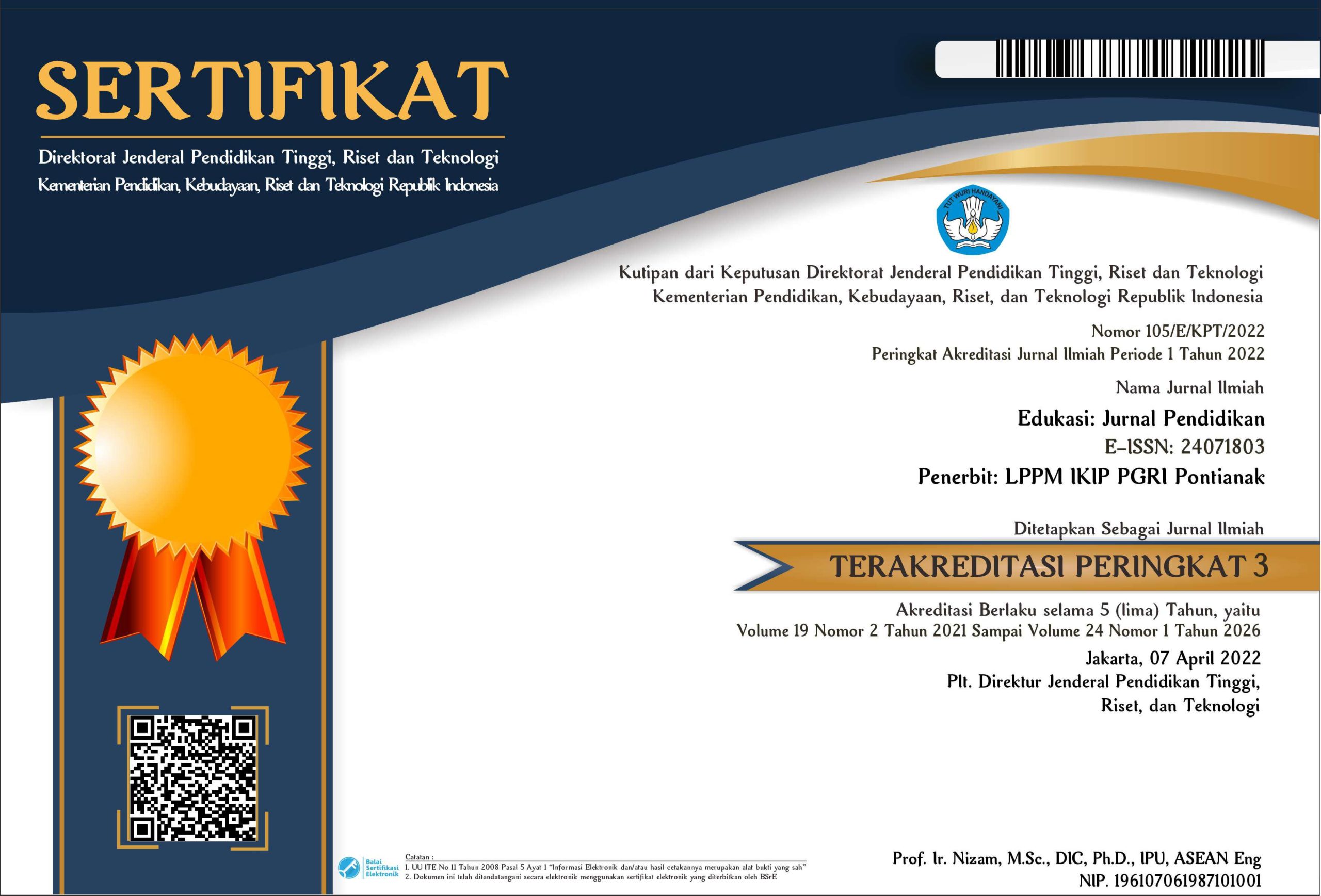Persepsi Mahasiswa terhadap Kecerdasan Emosional Setelah Diterapkan Teknik Collaborative Writing
DOI:
https://doi.org/10.31571/edukasi.v19i1.2400Keywords:
teknik collaborative writing, kecerdasan emosional, mahasiswa Bahasa Inggris, collaborative writing technique, emotional intelligence, English language studentsAbstract
Abstrak
Penelitian bertujuan untuk mengetahui apakah penerapan teknik collaborative writing dapat mengembangkan kecerdasan emosional mahasiswa. Penelitian menggunakan metode deskriptif kuantitatif. Alat pengumpul data menggunakan kuesioner berdasarkan pada 5 aspek kecerdasan emosional yang mencakup self-awareness, self-regulation, self-motivation, social awareness, dan social skills. Teknik analisis data dilakukan dengan perhitungan persentase dari butir kuesioner, dilanjutkan dengan interpretasi dan deskripsi data dari persepsi mahasiswa terhadap kecerdasan emosional setelah teknik collaborative writing diterapkan. Subjek penelitian adalah mahasiswa Sekolah Tinggi Bahasa Asing Pontianak yang mengikuti kelas Essay Writing dan Literary Criticism berjumlah 43 orang dan dipilih menggunakan teknik purposive sampling. Berdasarkan hasil analisis data, terjadi peningkatan kecerdasan emosional mahasiswa setelah diterapkannya teknik collaborative writing yang ditunjukkan dengan peningkatan respons pada aspek kecerdasan emosional.
Â
Abstract
This research aimed to find out if the implementation of collaborative writing techniques could develop the emotional intelligence of students. This research used descriptive quantitative method. Data collection tools used a questionnaire based on 5 aspects of emotional intelligence which include self-awareness, self-regulation, self-motivation, social awareness, and social skills. The data were analyzed by calculating the percentages of each questionnaire item, then continued to interpret and describe the implementation of collaborative writing technique. The subjects of this research were 43 students of Sekolah Tinggi Bahasa Asing Pontianak who enrolled in Essay Writing and Literary Criticism classes, with a total of 43 students who were selected using purposive sampling technique. The results of the data analysis indicated that there happened improvements towards the emotional intelligence after collaborative technique was implemented shown by the increase of positive responses on emotional intelligence aspects.
Downloads
References
Atika, A., & Kamaruzzaman. (2015). Upaya meningkatkan kecerdasan emosional melalui peer counseling pada siswa kelas X SMA Negeri 10 Pontianak. Sosial Horizon: Jurnal Pendidikan Sosial, 2(2), 121-130. http://dx.doi.org/ 10.31571/sosial.v2i2.99.
Bol, L., & Hacker, D. J. (2012). Calibration in N seel (Ed.), Encyclopedia of the Sciences of Learning. United States of America: Springer Science+Business Media. https://doi.org/10.1007/978-1-4419-1428-6.
Deveci, T. (2018). Student perceptions on collaborative writing in a project-based course. Universal Journal of Educational Research, 6(4), 721-732. https://doi.org/10.13189/ujer.2018.060415.
Emmanuel, D. O. O., Onyinye, O. R., & Chimezie, D. N. M. (2016). Competence among accounting students. Competence Among Accounting Undergraduates in South-East, 4(2), 1-12.
Fong, L. S. (2012). Benefits of collaborative writing for ESL advanced diploma students in the production of reports, 4(4), 396-407.
Goleman, D. (1996). Emotional intelligence: Why it can matter more than IQ. Great Britain: Bloomsbury Publishing.
Ghufron, M. N. (2016). Peran kecerdasan emosi dalam meningkatkan toleransi beragama. Fikrah: Jurnal Ilmu Aqidah dan Studi Keagamaan, 4(1), 138-153. http://dx.doi.org/10.21043/fikrah.v4i1.1664.
Hendryadi, H. (2017). Validitas isi: Tahap awal pengembangan kuesioner. Jurnal Riset Manajemen dan Bisnis (JRMB) Fakultas Ekonomi UNIAT, 2(2), 169-178. https://doi.org/10.36226/jrmb.v2i2.47.
Husain, R. (2013). Pengembangan model pembelajaran kolaboratif dalam meningkatkan hasil belajar warga belajar Paket C (Studi di SKB Kota Gorontalo). Journal of Chemical Information and Modeling, 53(9), 1689-1699.
Ibrahim, N., Shak, M. S. Y., Mohammad, T., Ismail, N. A., Perumal, P. D., Zaidi, A., & Yasin, S. M. A. (2015). The importance of implementing collaborative learning in the English as a second language (ESL) classroom in Malaysia. Procedia Economics and Finance, 31(15), 346-353. https://doi.org/10.1016/s2212-5671(15)01208-3.
Junus, F., & Andula, N. (2020). Pengaruh implementasi moodle dan model pembelajaran kolaboratif pada lingkungan blended learning terhadap peningkatan pemahaman belajar mahasiswa. Jurnal Teknologi Informasi dan Ilmu Komputer, 7(4), 797-806. http://dx.doi.org/10.25126/jtiik. 2020743289.
Kadeni. (2014). Pentingnya kecerdasan emosional dalam pembelajaran. Equilibrium: Jurnal Ilmiah Ekonomi dan Pembelajarannya, 2(1), 1-14. http://doi.org/10.25273/equilibrium.v2i1.601.
Le, H., Janssen, J., & Wubbels, T. (2018). Collaborative learning practices: teacher and student perceived obstacles to effective student collaboration. Cambridge Journal of Education, 48(1), 103-122. https://doi.org/10.1080/ 0305764X.2016.1259389.
Luy-Montejo, C. (2019). Problem based learning (PBL) in the Development of emotional intelligence of university students. Journal of Educational Psychology - Propositos y Representaciones, 7(2), 369-383.
Mandala, E., & Dihan, F. (2018). pengaruh kecerdasan emosional dan kecerdasan spiritual pada kepuasan kerja yang berdampak terhadap kinerja karyawan PT. Madu Baru Bantul, Yogyakarta. Kajian Bisnis Sekolah Tinggi Ilmu Ekonomi Widya Wiwaha, 26(1), 13-29. https://doi.org/10.32477/jkb. v26i1.127.
Masruroh, A. (2014). Konsep kecerdasan emosional dalam perspektif pendidikan Islam. MUDARRISA: Jurnal Kajian Pendidikan Islam, 6(1), 61-87. https://doi.org/10.18326/mdr.v6i1.61-87.
Nisa, H., Disman, D., & Dahlan, D. (2018). Pengaruh penerapan model pembelajaran kolaboratif teknik group investigation terhadap kemampuan berpikir analisis peserta didik. Manajerial: Jurnal Manajemen dan Sistem Informasi, 17(2), 157-166. https://doi.org/10.17509/manajerial.v17i2.10277.
Putri, P. P., & Hidayat, H. (2013). Hubungan antara pemanfaatan bahan pustaka perpustakaan sekolah dengan minat belajar siswa. Edulib, 1(1), 38-47. https://doi.org/https://doi.org/10.17509/edulib.v3i1.4147.
Putri, Y. S. (2016). Pengaruh kecerdasan intelektual, kecerdasan emosional, dan lingkungan kerja terhadap kinerja karyawan PT. PLN Persero area Klaten. Jurnal Studi Manajemen Organisasi, 13(1), 88-97. https://doi.org/10.14710/ jsmo.v13i1.13416.
Rahayu, E. S. (2016). Using Google Docs on collaborative writing technique for teaching English to non English department students. Proceedings of ISELT FBS Universitas Negeri Padang, 4(1), 226-236.
Romero-Ternero, M. C. (2013). Can cooperative learning promote emotional intelligence in our students? Academic and professional achievement. 7th IEEE International Conference on E-Learning in Industrial Electronics (ICELIE), 7(2013), 60-65.
Rustam. (2014). Pengembangan model bimbingan kelompok berbasis islami untuk meningkatkan kecerdasan emosional siswa. Sosial Horizon: Jurnal Pendidikan Sosial, 1(1), 83-94. http://dx.doi.org/10.31571/sosial.v1i1.150.
Serrat, O. (2017). Understanding and developing emotional intelligence. In knowledge solutions: Tools, methods, and approaches to drive organizational performance. Singapore: Springer. https://doi.org/10.1007/ 978-981-10-0983-9.
Sunita, W., Parmithi, N., & Yanti, N. P. W. R. (2020). Pengaruh model pembelajaran kolaboratif dan motivasi belajar terhadap hasil belajar Matematika peserta didik kelas X IPS SMA Negeri 1 Abiansemal. Emasains: Jurnal Edukasi Matematika dan Sains, 9(1), 45-55. https://doi.org/10.5281/zenodo.3743189.
Talib, T., & Cheung, Y. L. (2017). Collaborative writing in classroom instruction: A synthesis of recent research. The English Teacher, 46(2), 43-57.
Wicaksono, S. R. (2013). Implementation of collaborative learning in higher education environment. Journal of Education and Learning (EduLearn), 7(4), 219. https://doi.org/10.11591/edulearn.v7i4.196.
Yahaya, A., Ee, N. S., Bachok, J., Yahaya, N., Boon, Y., Hashim, S., & Lee, G. M. (2012). The impact of emotional intelligence element on academic achievement. Archives Des Sciences, 65(4), 2-16.
Yenti, N., Machasin, & Amsal, C. (2014). Pengaruh kecerdasan emosional, kecerdasan intelektual, dan disiplin terhadap kinerja perawat pada RS PMC Pekanbaru. Jurnal Online Mahasiswa Fakultas Ekonomi, 1(2), 1-21.
Zhang, M. (2018). Collaborative writing in the EFL classroom: The effects of L1 and L2 use. System, 76(4), 1-12. https://doi.org/10.1016/j.system. 2018.04.009.
Downloads
Published
How to Cite
Issue
Section
License
Authors who publish in this journal agree to the following terms:
- Authors retain copyright and grant the journal the right of first publication with the work simultaneously licensed under a Creative Commons Attribution License (CC-BY-NC) that allows others to share the work with an acknowledgment of the work's authorship and initial publication in this journal.
- Authors are able to enter into separate, additional contractual arrangements for the non-exclusive distribution of the journal's published version of the work (e.g., post it to an institutional repository or publish it in a book), with an acknowledgment of its initial publication in this journal.
- Authors are permitted and encouraged to post their work online (e.g., in institutional repositories or on their website) prior to and during the submission process, as it can lead to productive exchanges, as well as earlier and greater citation of published work.

 Download: 490
Download: 490


















